Search and rescue: Six powerful stories of survival
On Wednesday 29 September, the Geo Barents – MSF's search and rescue ship – arrived in Sicily carrying 60 vulnerable people saved at sea.
Among them were 24 children and teens, including one seven-week-old baby. All survivors on board had fled violence and abuse in Libya, in search of safety.
Since the beginning of 2021, more than 1,115 refugees and migrants have drowned or gone missing while attempting the dangerous journey across the central Mediterranean. At the same time, more than 25,000 people have been intercepted and forcibly returned to Libya, despite many carrying physical and psychological wounds from their time in the country.
Once safely on board the Geo Barents, some survivors chose to share their stories. They spoke of horrific journeys across the desert, the challenge of multiple border crossings, and the unspeakable but targeted violence of a humanitarian crisis that’s playing out on the edge of Europe.
* All survivors’ names have been changed to protect their identities
Baptiste, Sophie and baby Bienvenu
"I cried when I saw the rescue boat. I was crazy with happiness. We know we are here because of our child, Bienvenu, he brings us luck and happiness. He gave us the strength to go ahead."
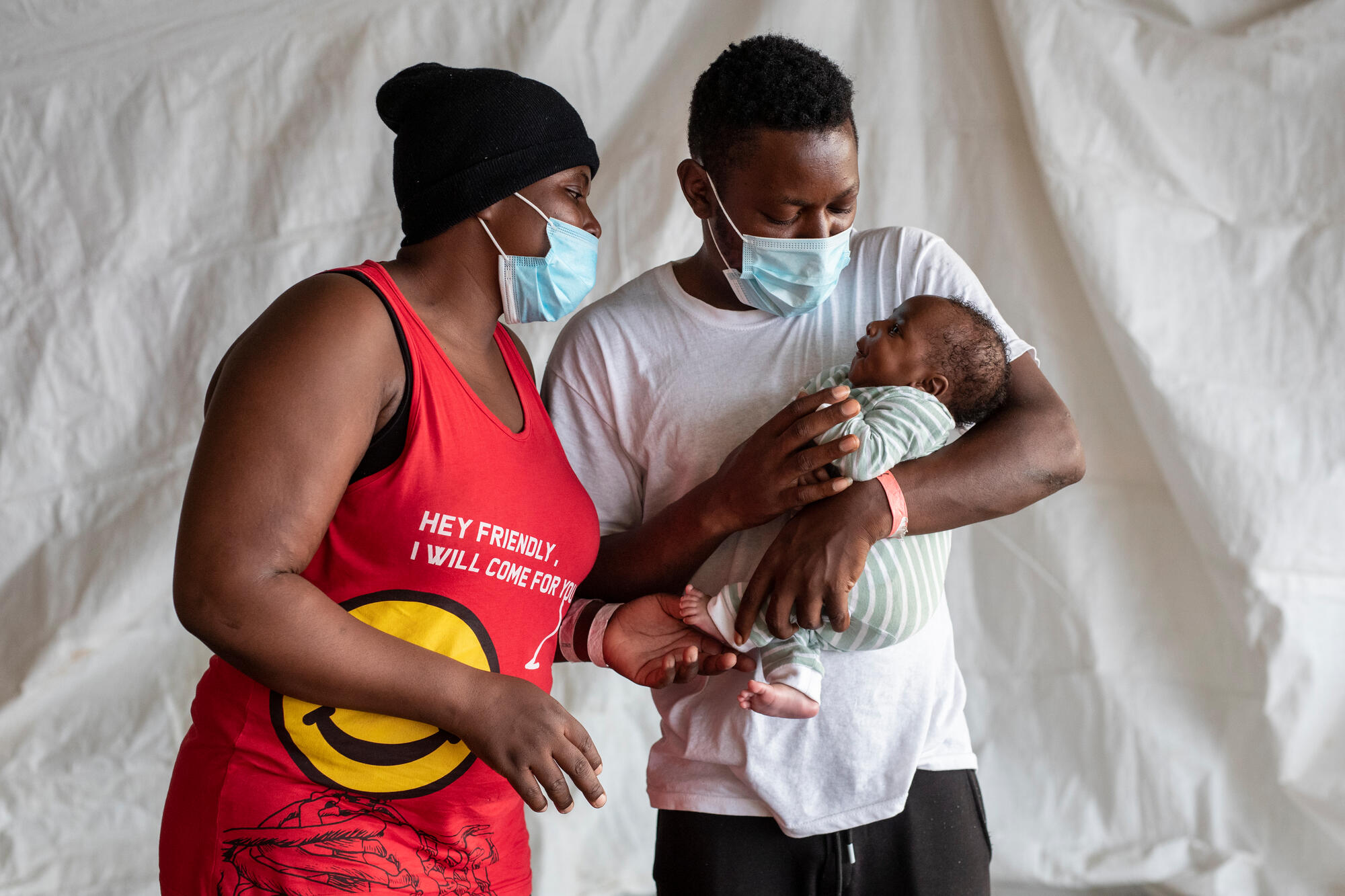
Baptiste, age 24, and Sophie, 27, are a couple from Cameroon. They were rescued along with their seven-week-old baby, Bienvenu. They undertook the perilous journey across the central Mediterranean to find a better place for Bienvenu to grow up.
Baptiste: "In 2021, Sophie and I arrived in Libya. I had never seen people behave in such an inhuman way. We have been treated worse than animals. En route, I witnessed a lot of violence, sexual violence and group rape. When we finally got to the capital, we found a hangar to live in. We found jobs, and we managed to eat something. These were really hard times, I felt desperately alone. I kept on living because of my family.
During that period, I got kidnapped and detained in a small, isolated room. The kidnappers forced me to call my mother in Cameroon, to ask her to pay a ransom or I would die. My mother had to sell the small piece of land we had. It was the only thing she had left.
I spent five days locked in that room before I got free. Eventually, some man dealt with them to get me out and he helped me to take care of myself.
I will always remember the day our child was born, on 6 August. My wife Sophie had to give birth to our baby at ‘home’, because access to health care doesn't exist in Libya for black people. I was treated like rubbish; a dog had more value than us."
Sophie: “On the day of the birth, I found myself without any medical care. During the whole pregnancy, I didn't even know whether my baby was in good health. I was frightened. The day of the birth a neighbour came to help me, but she was more nervous than me, her arms were shaking all the time. The birth was very hard.
After Bienvenu's birth, we rarely went out as the risk of kidnapping was so high. My child didn't receive any medical attention.”
Alpha
"People kept asking for water, but we were not given anything. Not even to the pregnant women. They didn’t even look at us, as if we were not there."
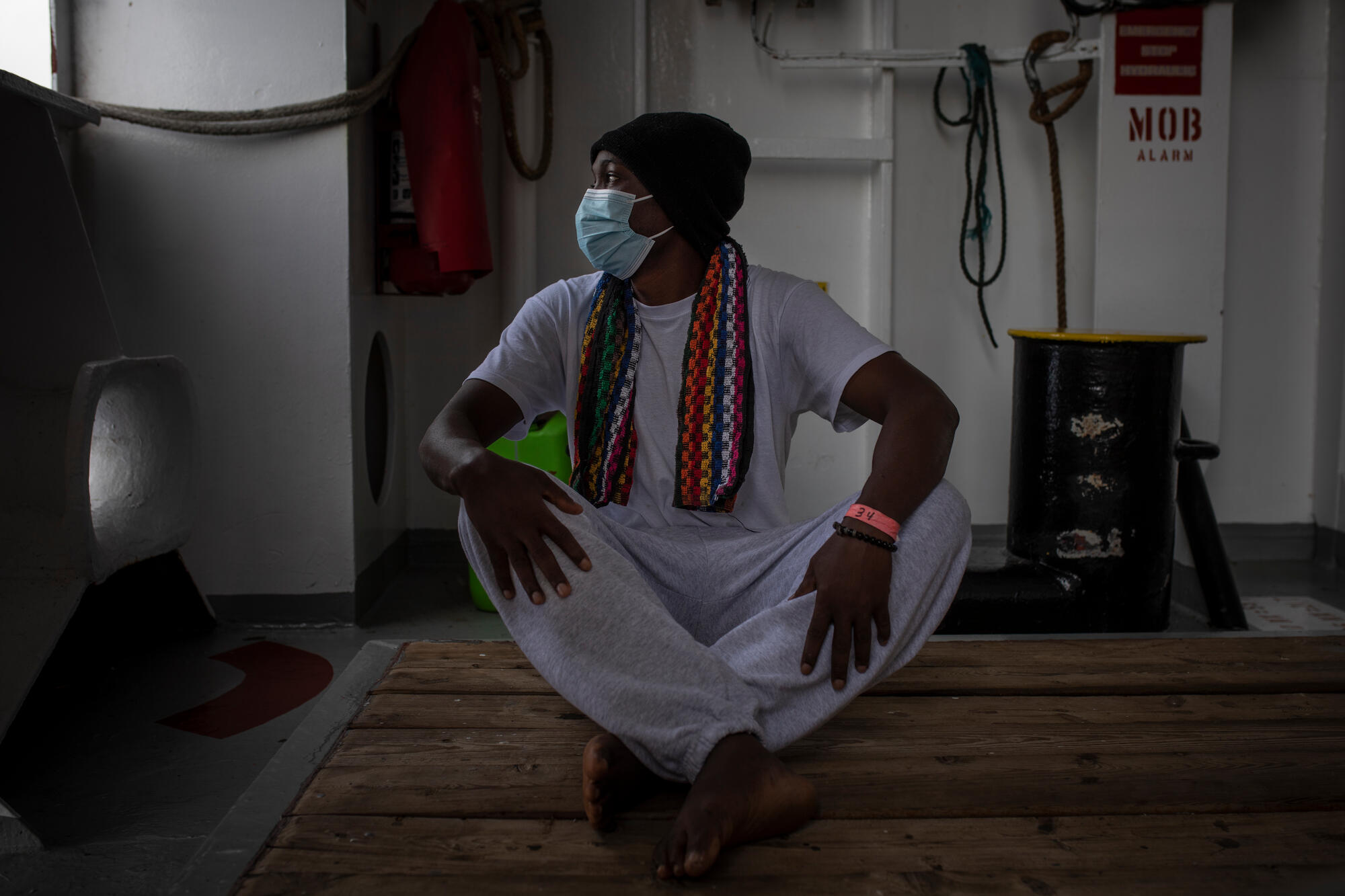
Alpha is 25 years old. He's from Guinea. He was rescued from a small, unstable boat carrying 54 people. Having crossed half the African continent to reach Libya, he was held there for nine months, enslaved and sold, only managing to cross the sea after months of mental and physical violence.
He remembers when he first arrived in Libya. It was at night, with a group of around 100 people, including pregnant women and children. Together they crossed the desert. On the other side of the border, he remembers that they were transferred to a warehouse, still in the middle of the desert. Their heads were covered with bags and they were locked inside for three days without food or water. Later, his group was transferred to another smuggler’s house, then a 'camp' in Zawiya. There they were subjected to abuse and torture.
"The site was managed by criminals who had forbidden us to go out. Everything we needed, food and water, had to be bought inside the camp. Once a guy went out for water and when he came back, he was beaten to death."
"After three months, we were sold and got on a boat to Europe, but the boat broke. We drifted into Tunisian waters and we were intercepted. We begged them to transfer us to a safe port,” says Alpha.
However, the Tunisian navy called the Libyan Coast Guard, who reportedly pushed them back to Tripoli.
“People kept asking for water, but we were not given anything. Not even to the pregnant women. They didn’t even look at us, as if we were not there.”
“When they put me in the truck, the guard started shooting into the air. I started crying because I thought my time was up. When we arrived at a detention centre, the guards said to us: ‘Do you want to go to Europe, here is Europe!’"
Alpha describes how they were beaten every day and subjected to extortion. Those who could not pay the ransom were forced to torture other detainees to gain their freedom. Alpha was made to call his family and the guards threatened that he would be dead within 24 hours if they did not pay.
Alpha was then forced to work after the payment was sent, and spent the next few months waiting for an opportunity to reach safety in Europe.
Bienaime
"The torture was so horrendous, the guards used to beat you to force you to call your family. When your relatives pick up the phone they beat you even harder to make your family suffer from your screams and pain."
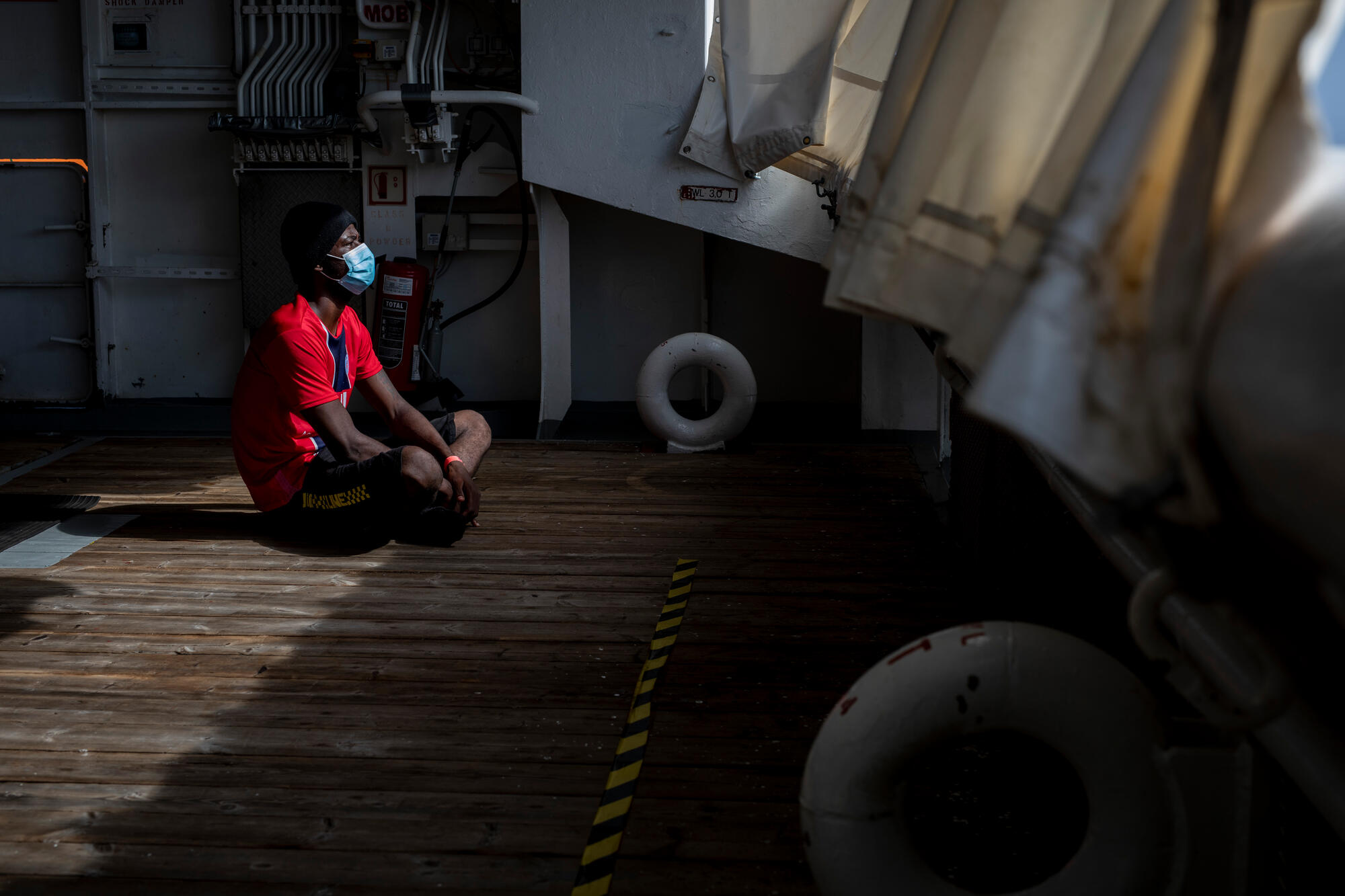
Twenty-five-year-old Bienaime is from Guinea. This is an extract of the painful story he shared with the team on board the Geo Barents:
“I am the oldest one, in charge of taking care of my whole family. In 2017 I left Nigeria by bus to Algeria. The trip lasted four days and cost me all my savings.
I arrived in Libya in 2017 and I spent five months there until I could attempt to cross the Mediterranean. Unfortunately, I was intercepted by the Libyan Coast Guard in international waters and brought back to a detention center in Zawiya, where I spent three months.
Detention in that place, in the end, is all about money, and if you don’t have money, you can stay forever – forgotten. Some of the detained people didn’t have money to pay and were forced to beat and mistreat other migrants themselves.
I have experienced physical and mental violence and torture because I couldn’t pay the ransom. The torture was horrendous, the guards used to beat you to force you to call your family. And, when your relatives pick up the phone they beat you even harder to make your family suffer from your screams and pain.
After some time, I managed to gather the money from my family and I was freed. I finally managed to escape to Algeria, where I’ve spent years working on a building site in Oran.
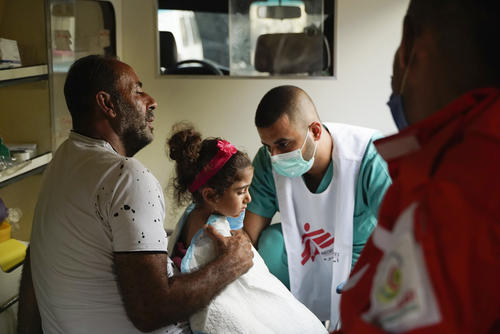
Get closer to the Frontline
Get the latest news, stories and updates, straight to your inbox.
In March 2020, I tried again and I crossed to Libya. Life in Libya was horrible, a terrible experience. I hope to get to Europe as soon as possible. Once I will arrive there, my only goal is to get a job and help my family as much as possible."
Kossi
"I always think about my mother. If I reach Europe and get a job, it will be for her."
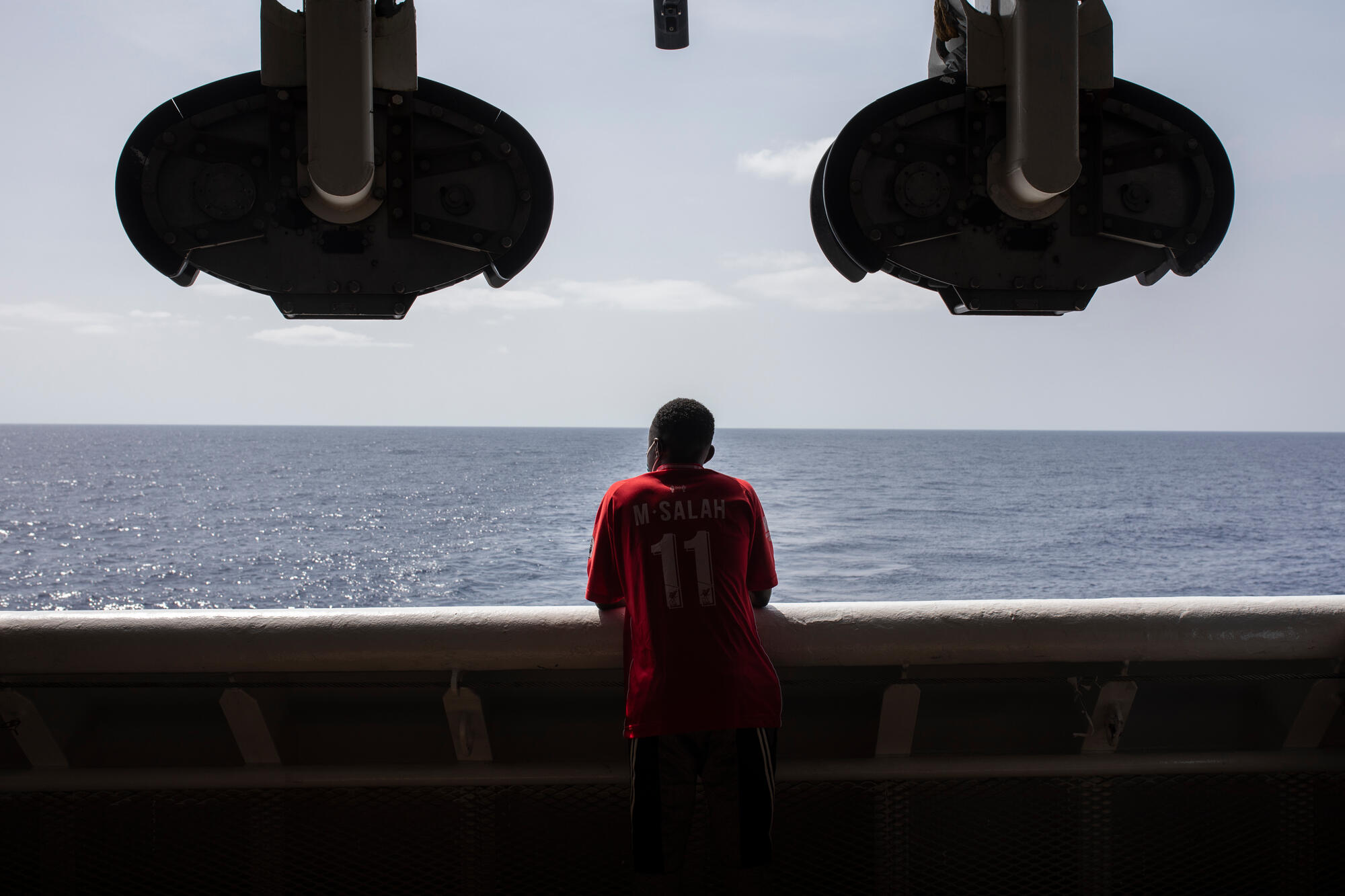
Kossi is a 34-year-old man from Togo, rescued from the same small boat along with 54 other people.
“In 2005, because of the political turmoil in Togo, I had to go into exile in Benin. I left my mother behind and it was so painful. That’s why I came back to Togo as soon as possible. But we were still really poor. In 2017 we were in such a desperate situation that I had to sleep in the bush.
My friend told me to go to Libya where he could find me a job.
In September 2017, I then left Togo for Nigeria, where I worked for two months to save money for the trip across the desert. But, on the way to Libya, I was caught by the Chadian police, along with 50 other people. When we heard that the Chadian guards were talking about selling people to smugglers, I managed to escape. For three days I hid in the desert until I could call a friend for help to reach Tripoli. That was in January 2018.
I started working in a carwash station to pay back the money I had borrowed from my friend. Sometime later, criminal gangs broke into our house and stole everything – mobile phones, savings. They kidnapped my friend, who had helped me to travel to Libya. I have not been able to contact him again. I found myself alone, living in the streets. In 2020, I was robbed and attacked again. Since then, I cannot walk easily.
This September, I tried to cross the Mediterranean and I was rescued by the MSF rescue ship.
I always think about my mother. If I reach Europe and get a job, it will be for her.”
Boubacar
"They killed some of my closest friends in front of me, it was horrific... Every day we would see wounded or even dead people. We were treated as if we were not human."
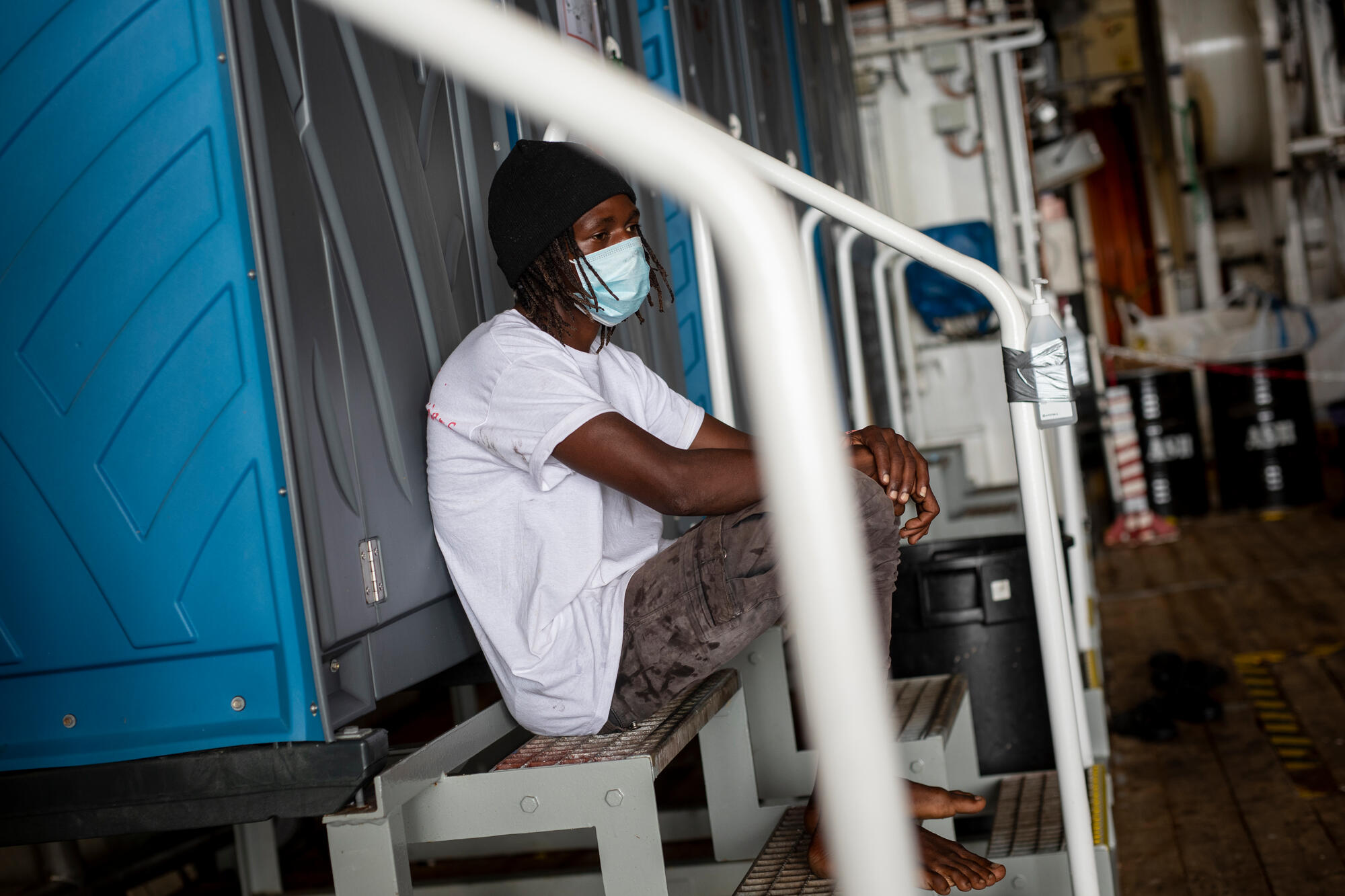
Twenty-year-old Boubacar is from Mali. After arriving in Libya in 2019, he was detained for several months and saw his friends being killed.
“Just the word ‘Libya’ is scary for me now. I spent a lot of time there, always trying to escape.
One night, we got into a 12-metre boat, but the engine stopped functioning and we had to go back. I then worked for five months before I tried to cross to Europe for a second time. We were caught at sea by armed guards in the middle of the night. They took us back to Libya and locked us up in a centre.
Conditions there were disgusting. They killed some of my closest friends in front of me, it was horrific. They meant a lot to me, after all the beatings and abuses we had gone through together. Every day we would see wounded or even dead people. We were treated as if we were not human. After months locked up, one day an airstrike hit the centre in Tripoli. I survived.
I tried to cross to Europe again, but the Libyans caught us again, and we were locked up, again. I spent another five months in a detention centre with three friends who all died there. Do you understand? They treated us so badly, repeatedly beating us with sticks, and my friends couldn't survive. We had to use that horrendous place as a toilet and drink the water from the same place.
I had been through so much that I was unable to talk to anybody. When I was sitting in a corner, people were saying ‘this man is crazy, get away from him’. In the detention centre, you do become crazy. While in Tripoli, I was locked up in the underground floor of a building, in complete isolation. After three months they let me go out to see the light finally. The day I saw the sun I thanked God.
Thank God, I'm still alive even though I've lost friends and brothers. I left the country without losing my soul, without losing my conscience, without losing my mind.”
Ayaan
"They came inside the room and threw women to the floor. They took off their clothes. They pulled their hair badly and hit them. They tortured us all the time."
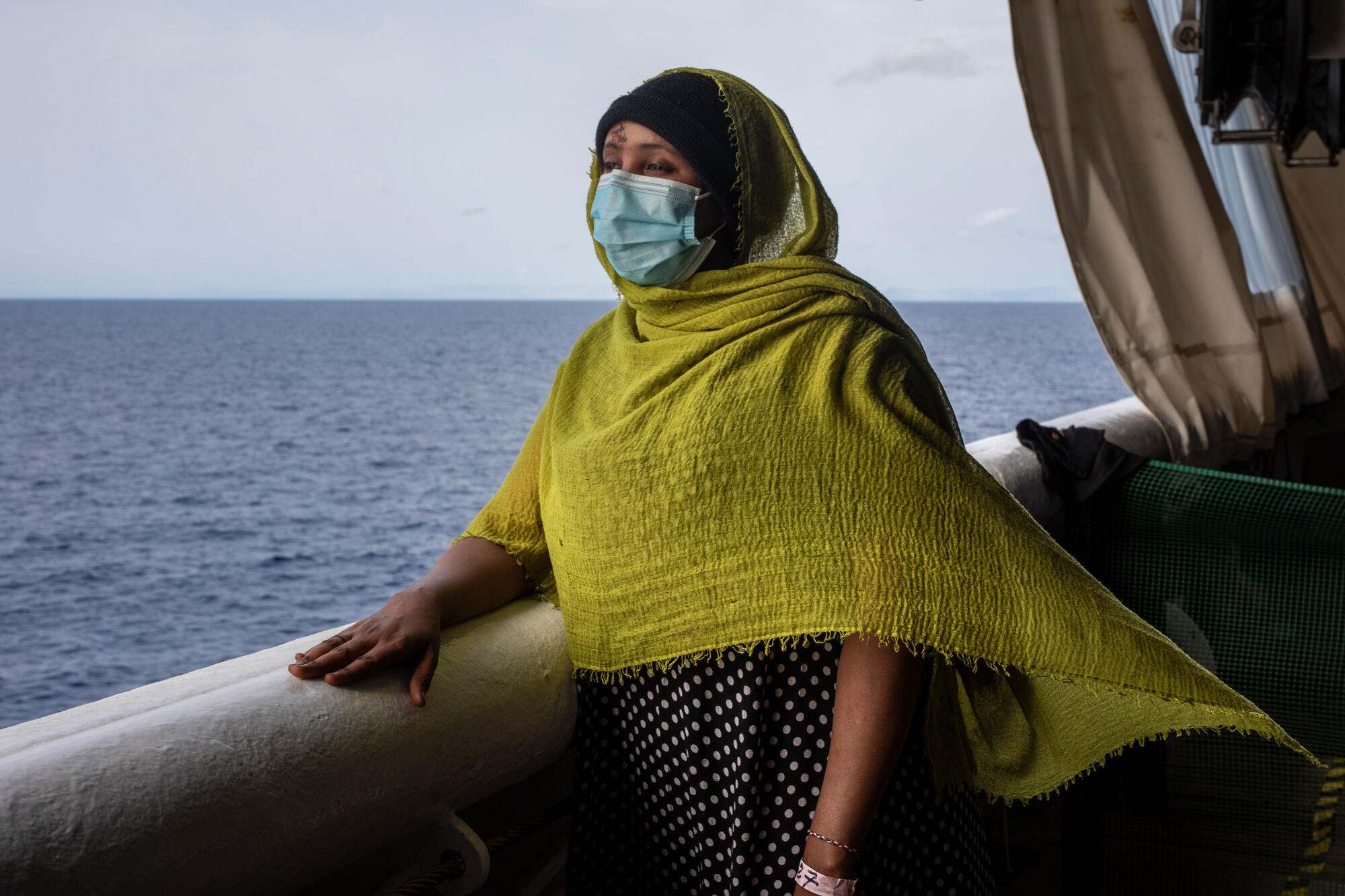
Ayaan, from Somalia, was rescued by the Geo Barents from a small, overcrowded boat. Once onboard she was treated by medical staff and a cultural mediator. She has scars on her neck and leg – the visible marks of her story.
Ayaan arrived in Libya in January 2020, after a long trip across Somalia, Ethiopia, and Sudan.
She was held against her will by smugglers in a room without windows and didn’t have any food or water. There was only one toilet for all the women being held captive in a small and suffocating space. Ayaan remembers that once she didn’t eat for seven days.
“The smugglers’ faces were covered all the time, we could only see their eyes. They used to stand all the time at the door, with guns. Escaping was just impossible.”
During her captivity, Ayaan says, she was beaten constantly with wires and electricity: “They came inside the room and threw women to the floor. They took off the women’s clothes. They pulled the women’s hair badly and hit them. They tortured us all the time.”
She tells us that many people from her country were held against their will and that most of them died in that place.
“When the COVID-19 pandemic arrived, everything got even worse for me.”
The torture and beatings increased and every day she was also forced to clean the smugglers’ houses. One day she managed to run away just to end up in another prison, in Zawiya. This time, however, different smugglers helped her and other Somalis to escape. She was injured during this attempt, causing a large wound on her forehead. She now hasn’t been able to contact her family for the last six months.
When she was asked what she expected for the future, she answered: “To find a job where I can help people in need. I want to help people.”
MSF and Mediterranean search and rescue
Every year, thousands of people flee violence, insecurity, and persecution. Many attempt a treacherous journey via North Africa and Turkey before crossing the Mediterranean Sea to reach safety in Europe.
And, every year, countless lives are lost along the way.